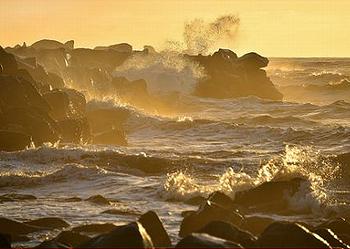
PARIS, France, November 27, 2013 (ENS) – Climate change is causing the world’s oceans to acidify at rates not seen for the last 55 million years, and the only way to moderate this danger is to reduce human emissions of carbon dioxide, conclude 540 scientists from 37 countries in a new report.
Their conclusion is the outcome of the Third Symposium on the Ocean in a High CO2 World that took place in Monterey, California in September 2012. The findings of these experts were presented in a report to the Conference on Climate Change that took place in Warsaw from November 11 to 22.

Reflecting the latest research on the subject, the report was prepared by UNESCO’s Intergovernmental Oceanographic Commission, the Scientific Committee on Ocean Research and the International Geosphere-Biosphere Programme.
The scientists expect “substantial changes” in marine ecosystems, marine biodiversity and coral reefs that have the potential to affect food security.
They warn that seashell fisheries could lose some US$130 billion annually, if current CO2 emissions remain unchanged.
It emerges that all the oceans, which together absorb close to one quarter of the CO2 emissions generated by human activity, have experienced an overall 26 percent rise in acidity since the dawn of the industrial age.
Twenty-four million tonnes of CO2 are absorbed by the oceans every day and, if current emission rates are maintained, the level of the ocean acidity worldwide will rise by 170 percent before 2100, compared to the pre-industrial age.
As acidity increases, the oceans are losing their ability to process atmospheric CO2 emissions and to mitigate climate change.
Even if all carbon emissions were stopped today the acidification would continue for decades, jeopardizing the stability of marine ecosystems, the scientists warn.
They say that this ongoing acidification is all the more worrying in view of other threats to marine ecosystems such as rising water temperatures, overfishing and pollution.
While sea grass and some phytoplankton species seem able to cope with higher acidity, other organisms, such as corals and crustaceans are likely to be severely affected. Reducing CO2 levels is the only way to minimize long-term, large-scale risks.

“Predicting how whole ecosystems will change in response to the combined effect of rising CO2 levels and warming temperatures remains challenging,” the scientists say.
“While we know enough to expect changes in marine ecosystems and biodiversity within our lifetimes, we are unable to make reliable, quantitative predictions of socio-economic impacts,” they say.
Several initiatives are underway to address the knowledge gap, foster new methods to examine the full ecosystem response to all these environmental factors and develop policy options.
The creation of the Ocean Acidification International Coordination Centre was announced in June 2012 at the UN’s Rio+20 summit. Based at the International Atomic Energy Agency’s Marine Environmental Laboratories in Monaco, this facility will communicate and promote international activities in ocean acidification research and observation and link science with policy.
It will be overseen by an advisory board of scientists, economists and institutions, including UNESCO’s Intergovernmental Oceanographic Commission, the U.S. National Oceanographic and Atmospheric Administration, the UN Food and Agriculture Organization and the Foundation Prince Albert II de Monaco.
A Global Ocean Acidification Observing Network also was established in June 2012. Working with the new International Coordination Centre, the network will measure chemical and ecosystem variables and ensure data quality and comparability. The goal is to provide a baseline for the timely assessment of ocean acidification impacts.
Future Earth, a new 10-year international research initiative on global sustainability, will provide a mechanism for developing an internationally coordinated research agenda that will include issues like ocean acidification.
Future Earth is sponsored by the Science and Technology Alliance for Global Sustainability. This alliance includes UNESCO, the International Council for Science, the International Social Science Council, the UN Environment Programm and the United Nations University.
Some of the same organizations sponsor the International Ocean Carbon Coordination Project, a monitoring and research program that focuses on the effect of increasing level CO2 emissions on oceans. These scientists study the effect of ocean acidification on calcifying organisms and coral growth rates.
The Ocean Acidification network provides a central source of information for ocean scientists and co-hosts the main international symposium on this issue, the Ocean in a High CO2 World. Held every four years, the symposium assesses what is known about ocean acidification and sets priorities for future research.
Copyright Environment News Service (ENS) 2013. All rights reserved.
